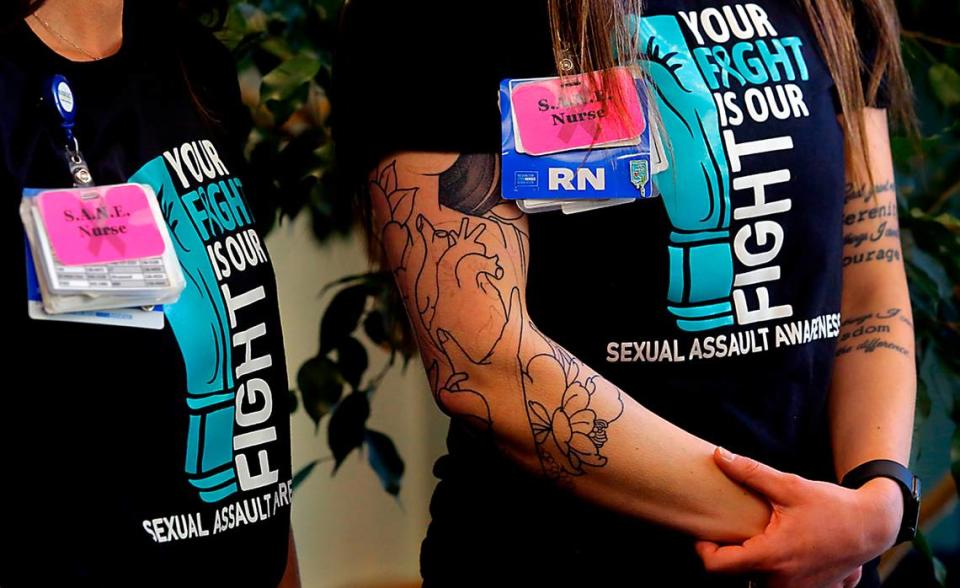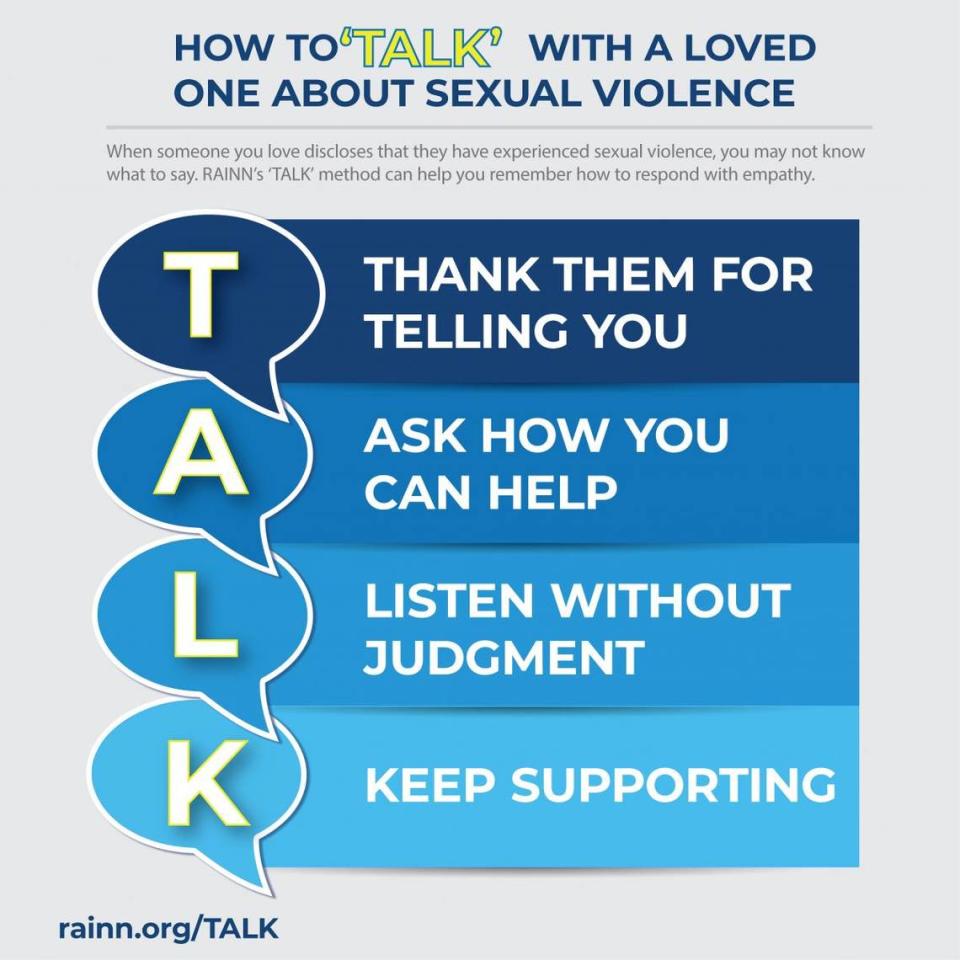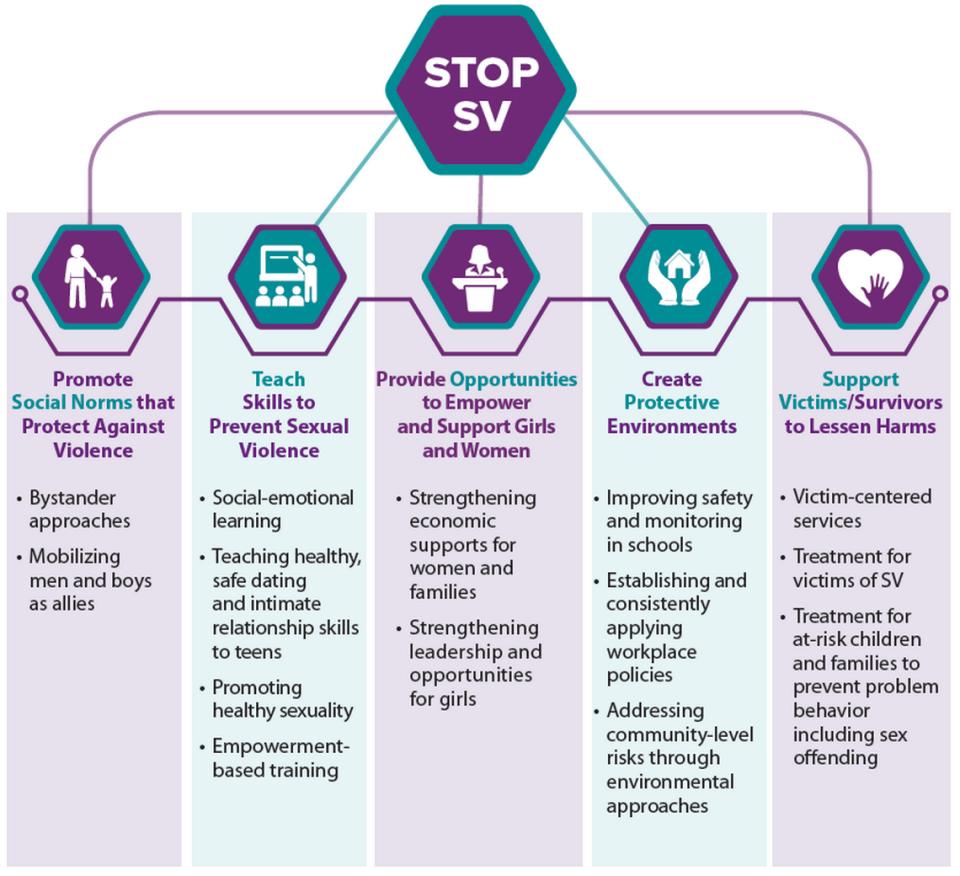‘Not alone.’ Sexual assault survivors can find help from special nurses in Tri-Cities
Sexual assault is real — and the trauma can be made worse when victims seek help after the attack.
Now advocates in the Tri-Cities are stressing the importance of continuous discussion about the realities faced by survivors and the resources available to them.
A program at Kadlec has been shown to result in victims being more likely to come forward, and to trust the support system in place.
“It happens, we know it happens and it’s important that we’re ready to take care of patients,” said Dr. John Matheson, emergency department medical director at Kadlec Regional Medical Center at a recent news event in Richland.

“It’s important that people feel safe coming to the emergency department. Not just physically safe, but emotionally safe. And we want them to know that they can trust us, that we’re here to help, to guide and to provide that compassion and care.”
Statistically, everyone knows at least one victim of sexual assault, based on current research out of several universities. Chances are, someone you know will need these resources and a support team at some point.
“For our community, we want you to know that abuse is not something that we can be quiet about,” said Marissa Gomez, Kadlec emergency department nurse and SANE (sexual assault nurse examiner) program coordinator. “It’s real, it’s prevalent and it’s going to need a systemic response.”
Kadlec has specially-trained nurses who respond to survivors of sexual assault who need help. Each member of the SANE staff has completed more than 40 hours of additional training specific to sexual abuse, domestic violence and human trafficking scenarios.
Sexual Assault Nurse Examiners (SANE)
The SANE training program is meant to ensure nurses can appropriately and compassionately care for survivors, while still adequately performing necessary exams.
The program grew in popularity in the 90s, when SANE programs were popping up at hospitals across the country. You can find a listing of Washington state programs here.
The nurses’ training allows them to consistently balance two sides of care, getting as much information and evidence as possible while meeting the patient’s need for delicacy and support. The nurses gather samples that could be used as evidence without violating or re-traumatizing the survivor.
Some states call the nurses Sexual Assault Forensic Examiners (SAFE) or Sexual Assault Examiners (SAE). Different areas will have varying requirements. All SANE nurses have to clock hours in the classroom and the clinic as they train. Once this is done, nurses must pass a test and evaluation.
Nurses with at least two years of experience as a working registered nurse can pursue SANE certification.
An Office of Justice Programs report by Linda Ledray describes the program as a “multi-disciplinary, victim-centered” method developed in 1976.
“Trained, experienced SANE practitioners help to preserve the victim’s dignity, enhance medical evidence collection for better prosecution, and promote community involvement and concern with crime victims and their families,” Ledray states.

SANE effectiveness
SANE nurses respond to sexual assault scenarios because their program has been proven to make survivors feel comfortable.
Research has shown that the layered approach of the program helps survivors feel more comfortable taking part in medical exams and testing, with a much larger margin of patients taking advantage of offered services after a SANE program was implemented.
SANE programs also have been found to increase collaboration between community agencies and boost forensic and legal outcomes while increasing the quality of the medical response.
“Where they exist, SANE programs have made a profound difference in the quality of care provided to sexual assault victims,” Kristin Littel stated in a bulletin for the Department of Justice’s Office for Victims of Crime.
A SANE program in New Mexico was evaluated in an Office of Justice Programs analysis through the first few years. It found that after the program was implemented, 58% more survivors chose to get an exam, 22% more chose to report the assault to the police and conviction lengths increased nearly five times.
“SANEs offer victims prompt, compassionate care and comprehensive forensic evidence collection,” Littel stated. “In addition to helping preserve the victim’s dignity and reduce psychological trauma, SANE programs are enhancing evidence collection for more effective investigations and better prosecutions.”
Tri-Cities resources
Kadlec wants the community to be aware of these nurses and other regional resources for people who have been sexually assaulted. It has 20 SANEs and partners with local organizations to continue care after hospital visits. They nurses respond when patients come in reporting sexual assault.
“Sexual assault affects every age, every gender, every race, every economic status,” said Kadlec’s Gomez at the press event. “Safety for ourselves and our community lies within awareness and education, so the more we know, the more we can help.”
Research suggests that historically, survivors were often re-traumatized when coming in for exams. By offering a specially-trained and compassionate nurse, the patient ultimately receives better care. If they want an exam, a SANE will be able to conduct one following the recommended guidelines and offering compassion.
While compassion and bedside manner are already part of a nurse’s duties, the SANE nurses have a higher standard due to the fragile state their patients are in. Each step needs to be done with extreme care and understanding.
Gomez says you need a support team after a traumatic event like a sexual assault. By offering dedicated medical staff to this purpose, patients may feel more at ease allowing SANEs on their support team.
“We believe the bravest thing someone can do is reach out for help and we’re committed to being there for you,” Gomez said. “As a society we have a long way to go, but our team promises to continue to learn, to grow and to advocate.”
What survivors should know
You will never be charged for an exam with SANE nurses—or any sexual assault exam.
It’s your choice to get an exam at all, you don’t have to.
Every step is your choice. Whether you report the incident to police, have tests done or anything else.
Gomez stressed the importance of survivors taking their own paths, acting as they see is best fit following a traumatic event.
“For survivors, I want you to know that assault is not your fault,” Gomez said. “We are here for you. We are here to help you, to give you options, to provide resources and to hopefully provide a light in a difficult time.”
Care for these patients goes beyond the emergency room.
SANEs continue to care for patients and ensure they’re set up with other resources as needed. Gomez says Kadlec partners with many community resources like the Support, Advocacy and Resource Center (SARC), Domestic Violence Services of Benton and Franklin Counties and Mirror Ministries.
Depending on a survivor’s wants and needs, their SANE will connect them with the appropriate option.
“Our big message is that you don’t have to do this alone,” Gomez said. “We all took this on because we want to help you. And we know there are options out there and we want to give them all to you, we want you to be able to write your own story and come to us when you need us.”
Sexual assault awareness
On average, one American is sexually assaulted every 68 seconds, according to the Rape, Abuse and Incest National Network.
Additionally, one in every six American women and one in every 10 men have been the victim of a rape or attempted rape.
If someone in your life tells you they have been sexually assaulted, the most important thing you can do is simply listen to them. Let them say what they want without pushing them and communicate without judgment.

Offer support when you can and be patient with them. Remind them it is not their fault and they are not alone.
The Centers for Disease Control and Prevention has created a prevention program to try and decrease the prevalence of sexual assaults and work toward ending sexual violence.
The program includes five categories: Promote social norms that protect against violence, teach skills to prevent sexual violence, provide opportunities to empower and support girls and women, create protective environments, and support victims and survivors to lessen harms.

“Knowledge is power. Educate yourself on the resources that we have in the community...” Gomez said. “Educate yourself, educate those around you and don’t stop talking about it.”
Sexual assault resources
Tri-Cities
Washington
United States

